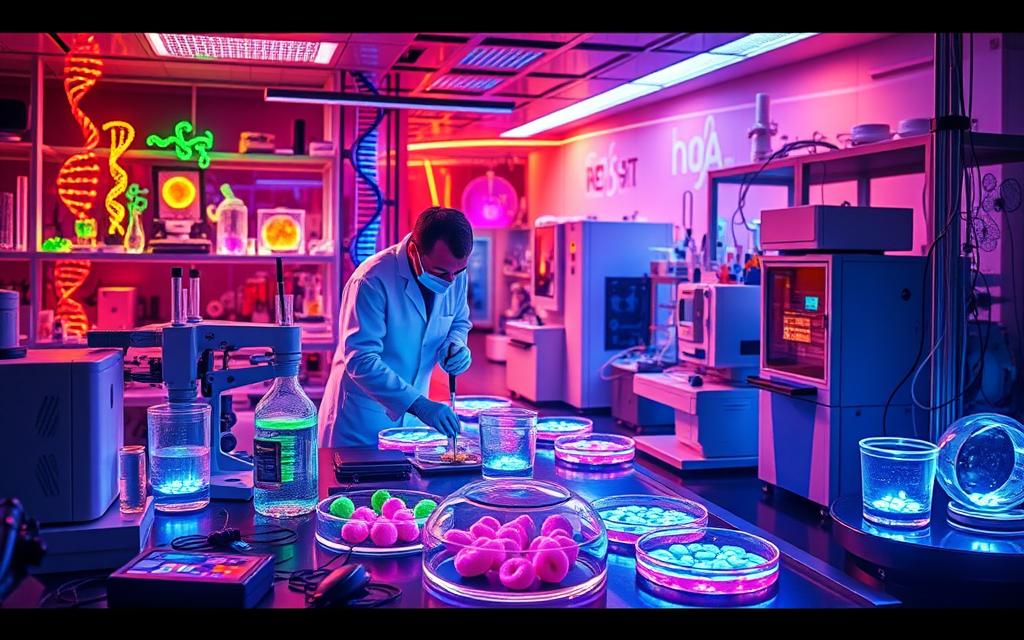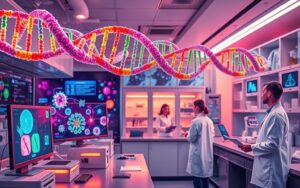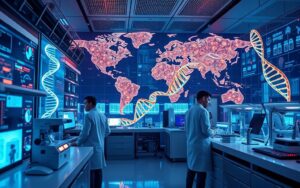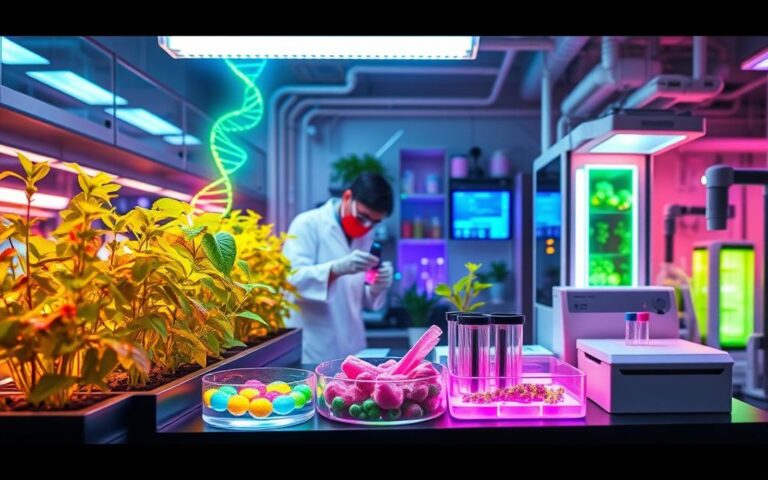Applications of Recombinant DNA Technology in Medicine
Recombinant DNA technology is a major breakthrough in medicine. It allows us to change genetic material for medical uses. Since the 1970s, it’s changed how we handle health care. It lets us make needed proteins and vaccines, making treatments like insulin for diabetes safer and more efficient.
Many recombinant medicines have gained FDA approval, offering new ways to fight diseases. This includes cancers and genetic issues. Things like human serum albumin and factor VIII for haemophilia show a major move to better treatments. They also lessen our need for animal-based sources.
Gene therapy uses this technology too. It offers new hope for treating genetic disorders that had no cure before. This brings new hope to patients all over the world.
Introduction to Recombinant DNA Technology
Recombinant DNA technology is a key step in genetic engineering, making precise DNA manipulation possible. This lets us add specific traits to organisms. The tech came about after Werner Arber of Switzerland found restriction enzymes in 1968. These enzymes cut DNA at precise spots, helping molecular biology grow.
Important tools in introducing recombinant DNA are plasmids and bacteriophages. They act as vectors because they can copy themselves inside host cells. This technology is crucial in fields like agriculture and healthcare. It’s behind genetically modified organisms like Flavr Savr tomatoes and golden rice.
In healthcare, it’s led to making important proteins, like insulin. Humulin, the first human insulin made this way, got U.S. Food and Drug Administration approval in October 1982. This changed how we treat diabetes. Gene cloning is also key for producing hormones, vitamins, and antibiotics.
PCR (Polymerase Chain Reaction) changes DNA manipulation by making it easy to copy specific DNA parts. This technique is important for research and diagnosing diseases. But, even small mistakes can mess up the results. Handling everything carefully ensures PCR experiments are reliable.
The impact of recombinant DNA technology goes beyond healthcare. It also helps in agriculture and protecting the environment. The field keeps evolving, promising more breakthroughs. Yet, it often faces ethical and regulatory questions. For more information, check this source.
Overview of Recombinant DNA Applications in Healthcare
Recombinant DNA technology has changed healthcare greatly. It has brought many ways to take care of patients and manage diseases better. This technology modifies genetic material to make important human proteins.
It has led to new ways to treat long-term conditions. For example, making human insulin started in 1983 with this technology. This was a big step forward in handling diabetes.
Now, it’s not just about insulin. We can make things like human growth hormones and monoclonal antibodies. This means we can target treatments better. It helps patients a lot.
Recombinant DNA is also key in making vaccines. Some vaccines don’t need to be kept cold anymore. This makes them easier to use, especially in places without good fridges.
These vaccines work well and are safer. They make strong immune responses with fewer side effects.
Gene therapy is also getting attention. It can help with inherited diseases and different cancers. This offers new hope for conditions that were hard to treat before.
To sum up, recombinant DNA technology has many uses in healthcare. It could lead to treatments made just for you. It has the potential to help many people around the world.
| Therapeutic Applications | Examples | Benefits |
|---|---|---|
| Insulin Production | Recombinant human insulin | Improved diabetes management |
| Hormones | Human growth hormone | Treatment for growth deficiencies |
| Monoclonal Antibodies | Rituximab, Trastuzumab | Targeted cancer therapies |
| Vaccines | Thermostable DNA vaccines | Effective disease prevention |
| Gene Therapy | CRISPR-modified therapies | Direct intervention of genetic disorders |
How is recombinant DNA technology used in medicine
Recombinant DNA technology is changing the medical scene. It lets us produce important proteins and push gene therapy forward. By adding specific genes into other organisms, this technology improves traditional methods. It tackles tough health problems too.
Production of Therapeutic Proteins
Using recombinant DNA, we can now make proteins to fight diseases. For instance, we now produce insulin in E. coli by using the human gene for insulin. This approach is safer and more effective than using animal sources. Also, medicines for anaemia and haemophilia have seen improvements. Recombinant DNA technology lets us make these helpful proteins in large amounts.
Gene Therapy Advancements
Gene therapy shows great promise for treating genetic illnesses. It works by fixing or replacing faulty genes. Thanks to better ways of delivering these genes, like using viruses, we can now more safely introduce them into humans. Successes in treating diseases such as cystic fibrosis and certain cancers are encouraging. Yet, we still face hurdles in targeting the right areas and dealing with the ethics of editing genes. Despite these challenges, gene therapy’s advancements offer hope for tackling genetic disorders.
Recombinant Vaccines and Their Importance
Recombinant vaccines are key in fighting infectious diseases. They use advanced recombinant DNA technology to create antigens that prompt strong immune responses. The hepatitis B vaccine is a prime example, using yeast to make antigens that are both safe and effective.
Recombinant vaccines offer significant advantages over traditional ones. They greatly reduce the risk of passing on infections, ensuring a safer vaccination experience. Plus, they can be made quickly to respond to new diseases. Various types, like recombinant protein vaccines, DNA vaccines, and live recombinant vaccines using bacteria or viruses, exist. Virus-like particles (VLPs) are especially good at triggering strong immune responses, making vaccines like the hepatitis B one very effective.
Right now, there are over 250 vaccine candidates aimed at tackling infectious diseases and cancers, according to research. DNA vaccines have shown success against a range of pathogens, like influenza and HIV, in animal studies. However, getting similar results in humans remains a challenge despite their safety and general tolerability.
As public health efforts progress, recombinant vaccines are set to play a vital role against diseases like HPV and COVID-19. With ongoing work to better adjuvants and delivery methods, the future of recombinant vaccines looks promising. They’re becoming key tools in global health strategies.
Developing Diagnostic Tools Using Recombinant DNA
Recombinant DNA technology has changed how we diagnose diseases today. It allows experts to find various illnesses, like HIV and genetic disorders, very accurately. This part will show how this cutting-edge technology has improved diagnostic tools.
Examples of Diagnostic Applications
Today, molecular techniques are key in making better diagnostic tools. ELISAs and RT-PCR are great at finding viral infections and genetic issues. They stand out in the medical field.
Here are some specific examples:
- HIV Detection: Tests using recombinant HIV proteins provide a more precise way to identify the virus in people.
- Genetic Testing: Recombinant DNA diagnostics help find genetic disorders early. This is crucial for deciding on treatment.
- Prenatal Diagnostics: Cloned probes can spot genetic diseases in unborn babies. This helps parents-to-be make important choices.
These tools not only improve how accurate diagnoses are but also lead to better clinical methods. Looking ahead, we expect to see quick and easy-to-use tests becoming more common. This shows the growing importance of recombinant DNA diagnostics in healthcare.
Recombinant DNA technology is paving the way for better diagnostic tools. It proves essential in the fight against diseases like HIV and more.
Challenges and Future Directions in Recombinant DNA Technology
Recombinant DNA technology has made big steps forward. Still, there are challenges, especially in the medical field. Ethical questions are crucial in the conversation about gene editing and biotechnology. These ethical issues go hand in hand with regulatory challenges in introducing new treatments.
The view of genetically modified organisms (GMOs) by the public can slow progress. This highlights the need for good education and debates.
The future looks bright for recombinant DNA technology. There’s a shift towards personalised medicine. It lets us make treatments that suit each person’s unique needs. This change calls for new ways to deliver gene therapies. They should work well and have fewer side effects.
There’s also progress in regenerative medicine. It uses recombinant techniques to fix or replace damaged body parts.
Exploring new protein engineering methods is key for future work. These techniques help make recombinant therapy products that are both effective and easy to get. The market for recombinant proteins has grown a lot, by 35% every year since 2001.

Studying human proteins could tell us more about diseases and lead to new treatments. The evolving field of proteomics is helping us know and measure proteins better during development.
| Year | Milestone | Impact |
|---|---|---|
| 1982 | First human protein derived (humulin) | Revolutionised diabetes treatment |
| 1997 | FDA approval spike for recombinant drugs | Broadened treatment options for several diseases |
| 2021 | Report on functional human brain tissue study | Illuminated prospects for Alzheimer’s and Parkinson’s research |
To overcome challenges in recombinant DNA, we need a clear direction for the future. Efforts must concentrate on both scientific breakthroughs and ethical discussions. We also need to engage the public more. Only with a united and informed effort can we unlock the full promise of recombinant DNA. This could improve our health and the environment.
Conclusion
Recombinant DNA technology has changed healthcare immensely. By 2001, more than 80 products based on this technology were out there. They help fight diseases and make vaccines. This shows the importance of the technology in overcoming big health problems. Making things like human insulin has marked huge advancements in medicine.
Looking forward, the field of medicine has lots to be excited about with this technology. Around 350 drugs were being tested back in 2001. Even with its challenges, recombinant DNA could change how we treat genetic issues, cancers, and infections. These developments are key to tackling worldwide health problems in the future.
As we learn more about genetics, recombinant DNA will stay important in medical breakthroughs. It’s not just about treatment. It also improves genetic testing and helps create better vaccines. This exploration shows us the great work done so far and the bright future ahead in improving human health and wellbeing.
FAQ
What is recombinant DNA technology?
Recombinant DNA technology lets us change genetic material from different sources. It helps make therapeutic proteins and improve genetic edits.
How does recombinant DNA technology impact healthcare?
It’s a game-changer for healthcare. It helps develop new treatments, like insulin, and advances in gene therapy for genetic issues.
What are recombinant vaccines and how are they beneficial?
Recombinant vaccines are made using this technology. They trigger strong immune responses. They’re safer and quicker to produce for new diseases.
How does recombinant DNA technology enhance diagnostic tools?
It boosts the accuracy and speed of tools like ELISAs and RT-PCR. These are crucial for spotting diseases, including HIV.
What challenges exist in the field of recombinant DNA technology?
The main issues are ethical concerns, regulatory barriers, and how people view GMOs. Education and dialogue are key to overcoming these.
What is the future potential of recombinant DNA technology in medicine?
The future looks bright. Expect strides in personalised medicine, gene therapy, and regenerative medicine. It’s an exciting time in medical biotech.









